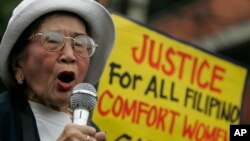Seventy years after the end of World War II, Japan's relations with neighbors South Korea and China continue to be strained by wartime grievances, while the Philippines, which Tokyo dominated for three years during the war, is maintaining major economic relations and strengthening security ties.
Some Filipinos have long, difficult memories of the Japanese occupation from 1942 through 1945.
Members of a dwindling group of survivors called the “Lolas,” or grandmothers in Filipino, say Japanese soldiers forced them to work as sex slaves.
Lola Hilaria Bustamante, 89, remembers being held captive for more than a year at a garrison in Bataan province.
“Everyday that’s what we did: washed laundry, cooked meals and then at night all sorts of men raped us, we did not know where they came from," Bustamante said.
Joined advocacy group
Bustamante said after American troops liberated the Philippines, she was able to leave the garrison, but she told no one other than her mother what had happened.
In the mid-1990s, Bustamante joined Lila Pilipina, a women’s advocacy group demanding justice for women like herself.
Lila Pilipina wants three things: a public apology from Japan's government, as well as compensation, and inclusion in Philippine history books.
The advocacy group estimates at least 1,000 Philippine women were victimized during World War II. Lila Pilipina President Richilda Extremadura said there are 70 such women still living today, but only six of them are physically able to get around.
“If they will let all those victims, survivors [be] gone before they make up their mind as a government to finally own up to the crime and give justice to the lolas… I think it will be too late for them," Extremadura said.
In 1993, the Japanese government acknowledged the military carried out a system of prostitution. But Tokyo did not admit that the practice was officially sanctioned. It is estimated that across all territories occupied by the Imperial Japanese Army, some 200,000 women were held as sex slaves.
Japan’s government created a women’s compensation fund financed through private donations and the Philippines accepted the compensation.
'Heroes Day' speech
In a speech last month during the Philippines “Heroes Day,” which commemorates World War II soldiers, Japan Ambassador Kazuhide Ishikawa apologized for the suffering Japan inflicted.
“Defeated in World War II, Japan has built up a free and democratic nation that upholds human rights and respects the rule of law,” Ishikawa said. “Japan has also been contributing to the peace, stability and prosperity of the Asia-Pacific region throughout these 70 years as a peace-loving nation, as one of the best partners of the Philippines and as an ally of the United States."
The lolas’ grievances have been hard to highlight in a country that has enjoyed historically strong trade ties to Japan.
Ricardo Jose is a World War II historian at the University of the Philippines who puts the countries' relations in the context of Spain’s nearly 400-year rule over the Philippines, until 1898.
“Even before the Spaniards came, the Japanese were already here. We had friendly trade relations with them. So in a sense, one might say the war was an aberration," Jose said.
The war reduced Manila and other cities to rubble. Some 1.1 million Philippines citizens died, many suffering major atrocities such as executions and torture.
Jose said people theorized that the country’s predominant Christian faith with an emphasis on forgiveness helped put relations back on track.
"Also others would say that because we don’t really hold grudges against people that much, we tend to forgive too easily or we fail to remember our history seriously. So by the '60s and '70s, people were beginning to welcome the Japanese, although there was a significant amount of distrust," he added.
Jose said in 1956 the Philippines and Japan came to an agreement over a reparations packet that was significantly less than the $8 billion the Philippines had originally sought. But without an official trade agreement, the two countries could not get back on solid economic footing.
When President Ferdinand Marcos declared martial law in 1972, he "unilaterally ratified" a bill on Japanese ties that had been idle for years because of lingering anti-Japanese sentiment. This opened the door to trade and major development loans from Japan that helped kick-start the economy, which was faltering under Marcos' watch.
Trading partner
Today, the Philippines' biggest trading partner is Japan, with about $1 billion in exports and about $500 million in imports. Japan is also the top Official Development Assistance lender, holding 36 percent of all development loans.
Hans Siriban, director of the Northeast Asia Division at the Philippine Foreign Affairs Department, said the relationship has grown stronger during the past five years of President Benigno Aquino’s term.
“There has been, we believe, very significant progress in terms of elevating the bilateral relations between the Philippines and Japan. It was under the administration of the president that we elevated our relations to a strategic partnership.”
Earlier this year, the two countries for the first time signed an agreement to strengthen defense ties, particularly in maritime security as they each face China over disputed territory in the South and East China seas.
The Philippines has expressed support for any relaxing of Japan’s post-World War II pacifist constitution that would allow it greater involvement in external defense. But groups like Lila Pilipina are keeping a wary eye on these developments.




